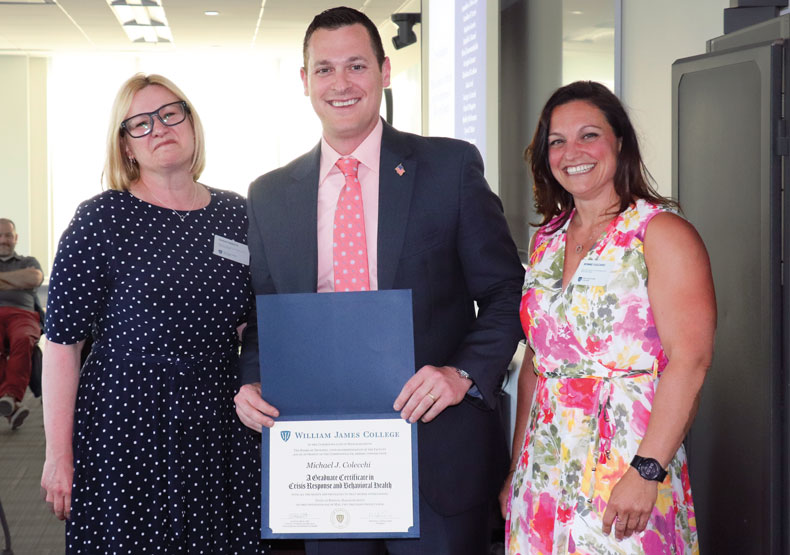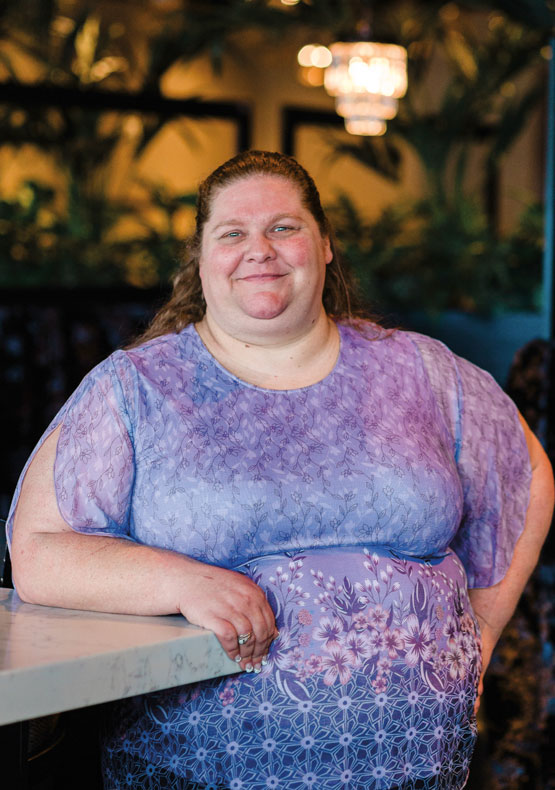Graduates Explore the Co-Response Model in Crisis Intervention

(L to R) CRBH Director, Sarah Abbott, PhD, Lieutenant Michael Colecchi, and CRBH Associate Director, Bonnie Cuccaro.
How Mental Health Professionals and Law Enforcement Collaborate to Support Individuals in Crisis
In 2022, The Center for Crisis Response and Behavioral Health (CRBH) at William James College became the first practical interdisciplinary co-response training program in the country to be housed within an academic institution. Since the inception of this landmark center, its curriculum has offered law enforcement and co-response clinicians the skills needed to identify, manage, and de-escalate situations involving persons in crisis. As the nation's first graduate certificate program in Co-Response, the CRBH is providing cutting-edge education and training for—as well as pathways to create effective partnerships between— mental health clinicians and law enforcement professionals in Massachusetts and beyond.
Meet two recent graduates who share the benefits of collaborating to address a critical need for reimagining and expanding opportunities in public safety.
Lieutenant Michael Colecchi, Franklin Police Department
As a patrol sergeant, Michael Colecchi was often faced with complex situations during routine calls for which he could have used more mental health training. When a colleague invited him to expand his skill set, he jumped at the chance.
“I now use a tool called the Columbia Protocol to help with suicide risk and prevention, which has transformed the way I approach my work,” says Colecchi who earned his Graduate Certificate in Crisis Response and Behavioral Health in May of 2024. Prior to enrolling, Colecchi and his colleagues had a limited understanding of how the mental health system operates and almost no knowledge of follow-up resources until bringing clinicians on board in 2018.
“We now have the ability to make a joint assessment of what’s going on from a mental health perspective and are poised to allocate resources and provide follow up to those in need,” says Colecchi of a welcome shift.
In addition to the intensive, skills-based coaching Colecchi received over the course of his certificate program, the connections he gained were top-notch.
“I met officers and clinicians from across the Commonwealth, and my networking abilities have increased ten-fold,” he says, citing the real-time feedback he received as invaluable.
Ditto for access to information about threat assessments and training on human trafficking and interacting with neurodivergent individuals, including those with autism.
“The resources that William James College provided were super informative,” says Colecchi who recommended another patrolman follow in his footsteps this fall.
As to the most impactful part of his experience? “Instead of a single interaction with the cops, we’re taking a multi-pronged approach to putting at-risk community members on a path to getting the help they need.”
 Jessica Brooks, LCSW, Clinical and Support Options
Jessica Brooks, LCSW, Clinical and Support Options
As a co-response clinician in western Massachusetts, Jessica Brooks works with eight rural police departments on any given day to support 11,000 community members across 200 square miles.
Four years ago, Brooks found her way to Clinical and Support Options (CSO)—a community-based non profit behavioral health agency—where she worked in various capacities, ultimately securing an open co-response position upon earning her MSW. When a supervisor suggested she apply to the Graduate Certificate in Crisis Response and Behavioral Health program at William James College, Brooks jumped at the chance; she completed the program, which culminated in May of 2023, at no cost thanks to a scholarship from the Department of Mental Health.
“If a 9-1-1 call is placed because someone is suicidal, it benefits all involved to take a team approach,” says Brooks of the intention she places around getting folks the help they need in their moment of crisis.
“We’ve all learned the importance of getting individuals connected to the proper mental health services rather than sectioning or arresting them for the behaviors resulting from the crisis,” says Brooks.
Prior to the co-response model, law enforcement had limited tools available —most of which precluded an individual being seen by a mental health professional prior to being released.
A background in crisis work, coupled with personal experience in the foster care system, inspires Brooks to continue making a difference.
“Even if I only meet somebody one time, and they don't even remember my name, if I am able to slow down and communicate, You matter in this world, I’ve done my job.”
- Tags:
- In the Community
Topics/Tags
Follow William James College
Media Contact
- Katie O'Hare
- Senior Director of Marketing
- katie_ohare@williamjames.edu
- 617-564-9389
